Business Ethics Assignment: Analyzing a Retail Store's Dilemma
VerifiedAdded on 2023/06/03
|5
|1172
|195
Homework Assignment
AI Summary
This assignment analyzes a case study involving a retail store manager, Rajah, who is instructed to implement a policy of not returning small change to customers, which he perceives as unethical. The assignment addresses several key questions, including Rajah's ethical obligations, the concept of whistleblowing, and the unethical nature of the one-cent policy. It explores the importance of ethics training for employees and employers, suggesting that such training should be conducted regularly to maintain a positive working culture and address ethical dilemmas effectively. The analysis emphasizes the importance of ethical decision-making in business and the potential consequences of unethical practices. The document also provides a comprehensive list of references supporting the analysis.
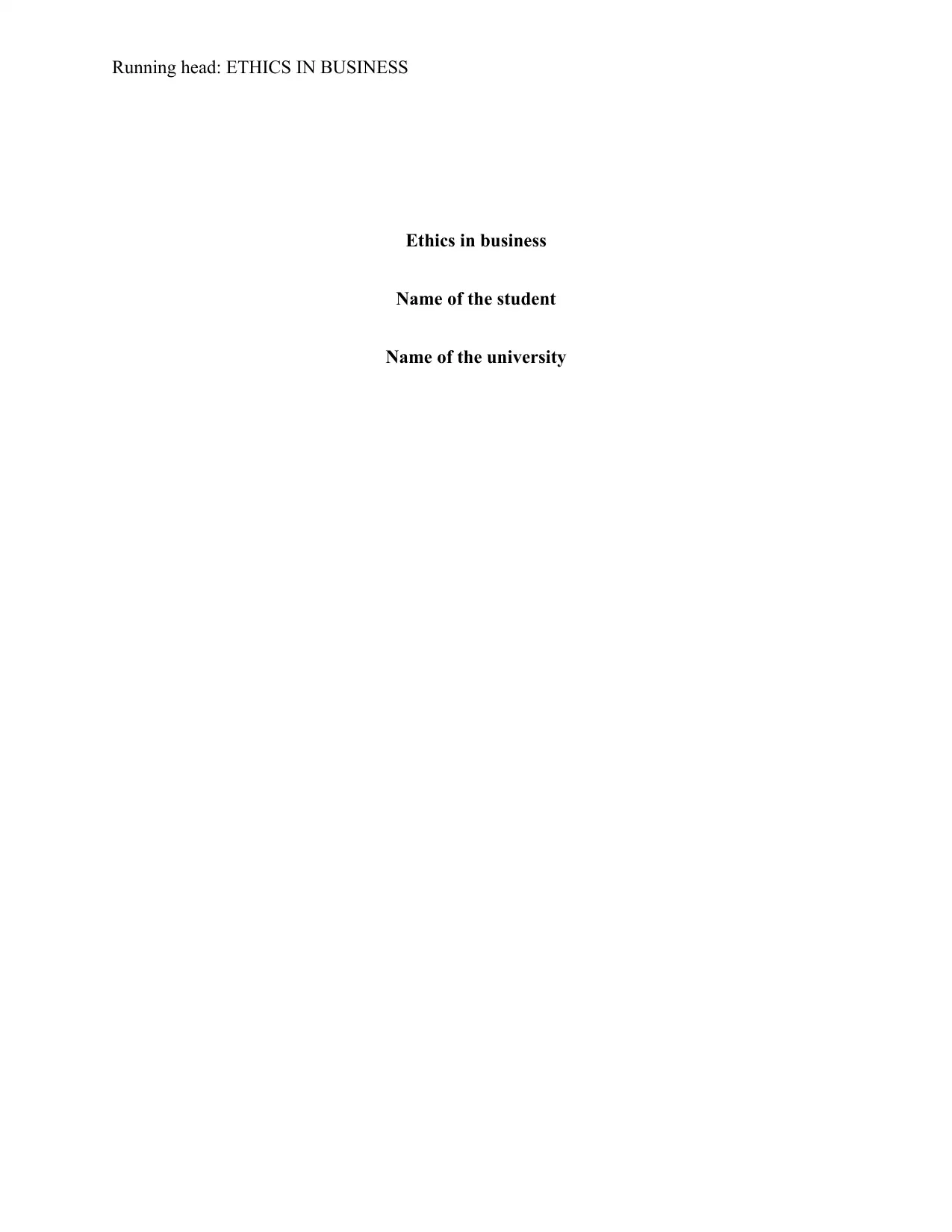
Running head: ETHICS IN BUSINESS
Ethics in business
Name of the student
Name of the university
Ethics in business
Name of the student
Name of the university
Paraphrase This Document
Need a fresh take? Get an instant paraphrase of this document with our AI Paraphraser
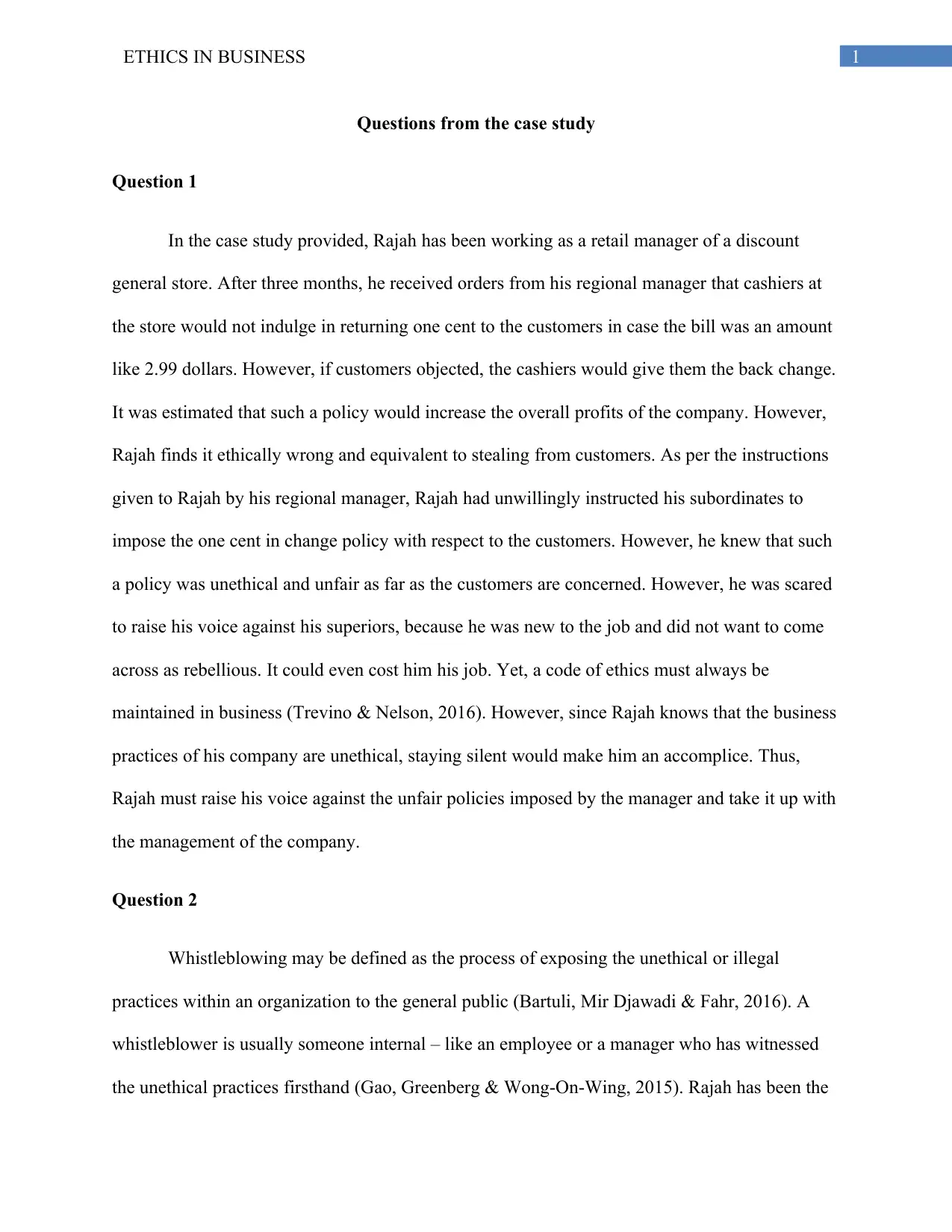
1ETHICS IN BUSINESS
Questions from the case study
Question 1
In the case study provided, Rajah has been working as a retail manager of a discount
general store. After three months, he received orders from his regional manager that cashiers at
the store would not indulge in returning one cent to the customers in case the bill was an amount
like 2.99 dollars. However, if customers objected, the cashiers would give them the back change.
It was estimated that such a policy would increase the overall profits of the company. However,
Rajah finds it ethically wrong and equivalent to stealing from customers. As per the instructions
given to Rajah by his regional manager, Rajah had unwillingly instructed his subordinates to
impose the one cent in change policy with respect to the customers. However, he knew that such
a policy was unethical and unfair as far as the customers are concerned. However, he was scared
to raise his voice against his superiors, because he was new to the job and did not want to come
across as rebellious. It could even cost him his job. Yet, a code of ethics must always be
maintained in business (Trevino & Nelson, 2016). However, since Rajah knows that the business
practices of his company are unethical, staying silent would make him an accomplice. Thus,
Rajah must raise his voice against the unfair policies imposed by the manager and take it up with
the management of the company.
Question 2
Whistleblowing may be defined as the process of exposing the unethical or illegal
practices within an organization to the general public (Bartuli, Mir Djawadi & Fahr, 2016). A
whistleblower is usually someone internal – like an employee or a manager who has witnessed
the unethical practices firsthand (Gao, Greenberg & Wong-On-Wing, 2015). Rajah has been the
Questions from the case study
Question 1
In the case study provided, Rajah has been working as a retail manager of a discount
general store. After three months, he received orders from his regional manager that cashiers at
the store would not indulge in returning one cent to the customers in case the bill was an amount
like 2.99 dollars. However, if customers objected, the cashiers would give them the back change.
It was estimated that such a policy would increase the overall profits of the company. However,
Rajah finds it ethically wrong and equivalent to stealing from customers. As per the instructions
given to Rajah by his regional manager, Rajah had unwillingly instructed his subordinates to
impose the one cent in change policy with respect to the customers. However, he knew that such
a policy was unethical and unfair as far as the customers are concerned. However, he was scared
to raise his voice against his superiors, because he was new to the job and did not want to come
across as rebellious. It could even cost him his job. Yet, a code of ethics must always be
maintained in business (Trevino & Nelson, 2016). However, since Rajah knows that the business
practices of his company are unethical, staying silent would make him an accomplice. Thus,
Rajah must raise his voice against the unfair policies imposed by the manager and take it up with
the management of the company.
Question 2
Whistleblowing may be defined as the process of exposing the unethical or illegal
practices within an organization to the general public (Bartuli, Mir Djawadi & Fahr, 2016). A
whistleblower is usually someone internal – like an employee or a manager who has witnessed
the unethical practices firsthand (Gao, Greenberg & Wong-On-Wing, 2015). Rajah has been the
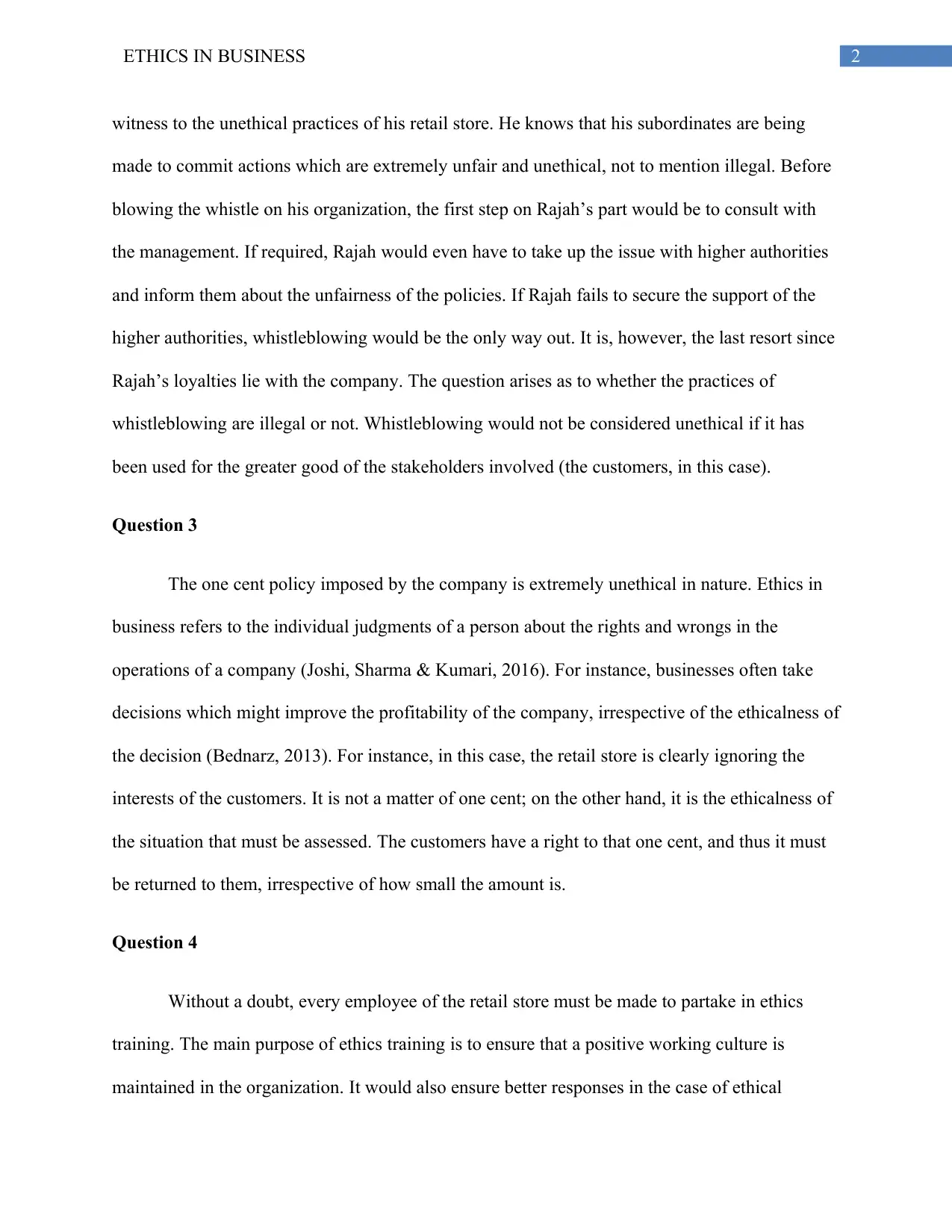
2ETHICS IN BUSINESS
witness to the unethical practices of his retail store. He knows that his subordinates are being
made to commit actions which are extremely unfair and unethical, not to mention illegal. Before
blowing the whistle on his organization, the first step on Rajah’s part would be to consult with
the management. If required, Rajah would even have to take up the issue with higher authorities
and inform them about the unfairness of the policies. If Rajah fails to secure the support of the
higher authorities, whistleblowing would be the only way out. It is, however, the last resort since
Rajah’s loyalties lie with the company. The question arises as to whether the practices of
whistleblowing are illegal or not. Whistleblowing would not be considered unethical if it has
been used for the greater good of the stakeholders involved (the customers, in this case).
Question 3
The one cent policy imposed by the company is extremely unethical in nature. Ethics in
business refers to the individual judgments of a person about the rights and wrongs in the
operations of a company (Joshi, Sharma & Kumari, 2016). For instance, businesses often take
decisions which might improve the profitability of the company, irrespective of the ethicalness of
the decision (Bednarz, 2013). For instance, in this case, the retail store is clearly ignoring the
interests of the customers. It is not a matter of one cent; on the other hand, it is the ethicalness of
the situation that must be assessed. The customers have a right to that one cent, and thus it must
be returned to them, irrespective of how small the amount is.
Question 4
Without a doubt, every employee of the retail store must be made to partake in ethics
training. The main purpose of ethics training is to ensure that a positive working culture is
maintained in the organization. It would also ensure better responses in the case of ethical
witness to the unethical practices of his retail store. He knows that his subordinates are being
made to commit actions which are extremely unfair and unethical, not to mention illegal. Before
blowing the whistle on his organization, the first step on Rajah’s part would be to consult with
the management. If required, Rajah would even have to take up the issue with higher authorities
and inform them about the unfairness of the policies. If Rajah fails to secure the support of the
higher authorities, whistleblowing would be the only way out. It is, however, the last resort since
Rajah’s loyalties lie with the company. The question arises as to whether the practices of
whistleblowing are illegal or not. Whistleblowing would not be considered unethical if it has
been used for the greater good of the stakeholders involved (the customers, in this case).
Question 3
The one cent policy imposed by the company is extremely unethical in nature. Ethics in
business refers to the individual judgments of a person about the rights and wrongs in the
operations of a company (Joshi, Sharma & Kumari, 2016). For instance, businesses often take
decisions which might improve the profitability of the company, irrespective of the ethicalness of
the decision (Bednarz, 2013). For instance, in this case, the retail store is clearly ignoring the
interests of the customers. It is not a matter of one cent; on the other hand, it is the ethicalness of
the situation that must be assessed. The customers have a right to that one cent, and thus it must
be returned to them, irrespective of how small the amount is.
Question 4
Without a doubt, every employee of the retail store must be made to partake in ethics
training. The main purpose of ethics training is to ensure that a positive working culture is
maintained in the organization. It would also ensure better responses in the case of ethical
⊘ This is a preview!⊘
Do you want full access?
Subscribe today to unlock all pages.

Trusted by 1+ million students worldwide
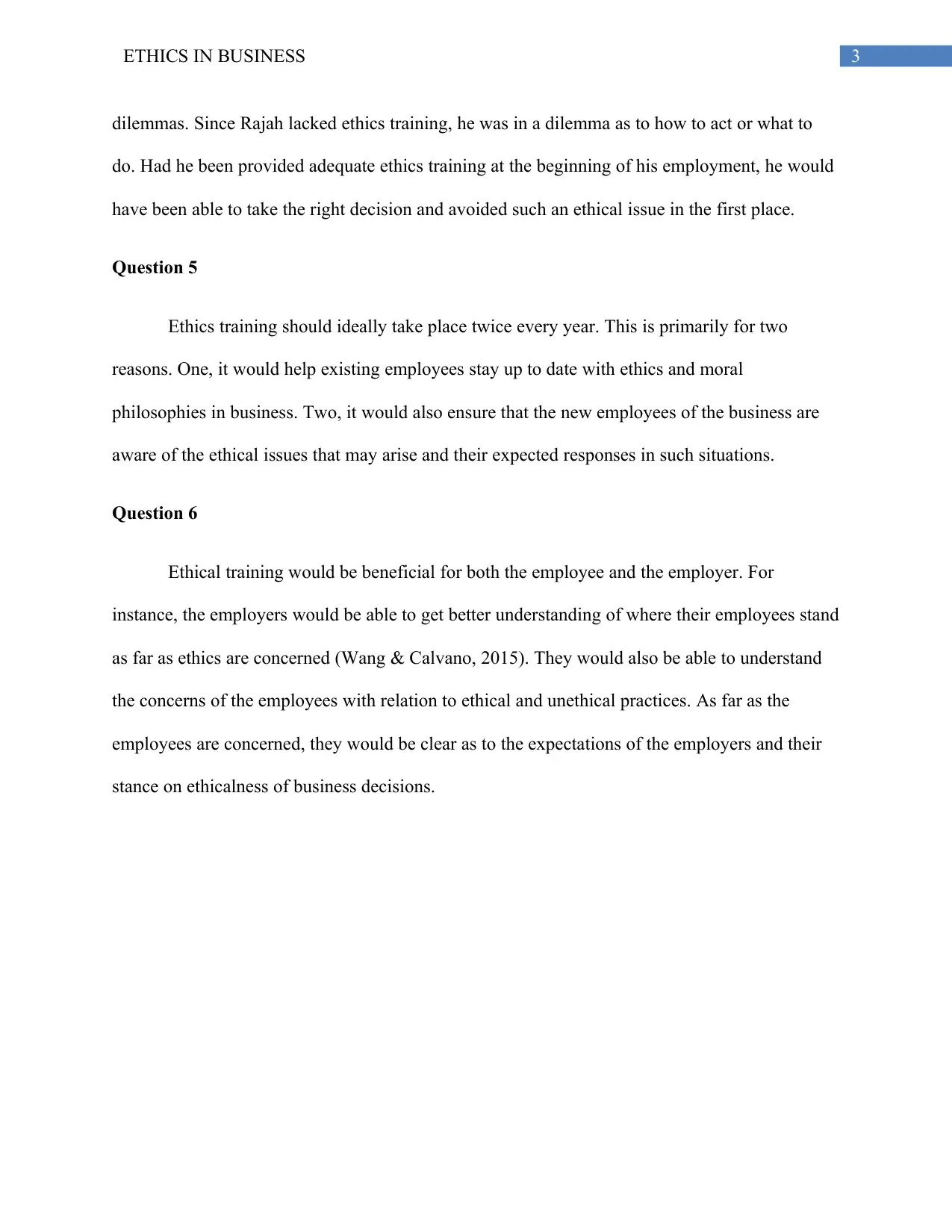
3ETHICS IN BUSINESS
dilemmas. Since Rajah lacked ethics training, he was in a dilemma as to how to act or what to
do. Had he been provided adequate ethics training at the beginning of his employment, he would
have been able to take the right decision and avoided such an ethical issue in the first place.
Question 5
Ethics training should ideally take place twice every year. This is primarily for two
reasons. One, it would help existing employees stay up to date with ethics and moral
philosophies in business. Two, it would also ensure that the new employees of the business are
aware of the ethical issues that may arise and their expected responses in such situations.
Question 6
Ethical training would be beneficial for both the employee and the employer. For
instance, the employers would be able to get better understanding of where their employees stand
as far as ethics are concerned (Wang & Calvano, 2015). They would also be able to understand
the concerns of the employees with relation to ethical and unethical practices. As far as the
employees are concerned, they would be clear as to the expectations of the employers and their
stance on ethicalness of business decisions.
dilemmas. Since Rajah lacked ethics training, he was in a dilemma as to how to act or what to
do. Had he been provided adequate ethics training at the beginning of his employment, he would
have been able to take the right decision and avoided such an ethical issue in the first place.
Question 5
Ethics training should ideally take place twice every year. This is primarily for two
reasons. One, it would help existing employees stay up to date with ethics and moral
philosophies in business. Two, it would also ensure that the new employees of the business are
aware of the ethical issues that may arise and their expected responses in such situations.
Question 6
Ethical training would be beneficial for both the employee and the employer. For
instance, the employers would be able to get better understanding of where their employees stand
as far as ethics are concerned (Wang & Calvano, 2015). They would also be able to understand
the concerns of the employees with relation to ethical and unethical practices. As far as the
employees are concerned, they would be clear as to the expectations of the employers and their
stance on ethicalness of business decisions.
Paraphrase This Document
Need a fresh take? Get an instant paraphrase of this document with our AI Paraphraser
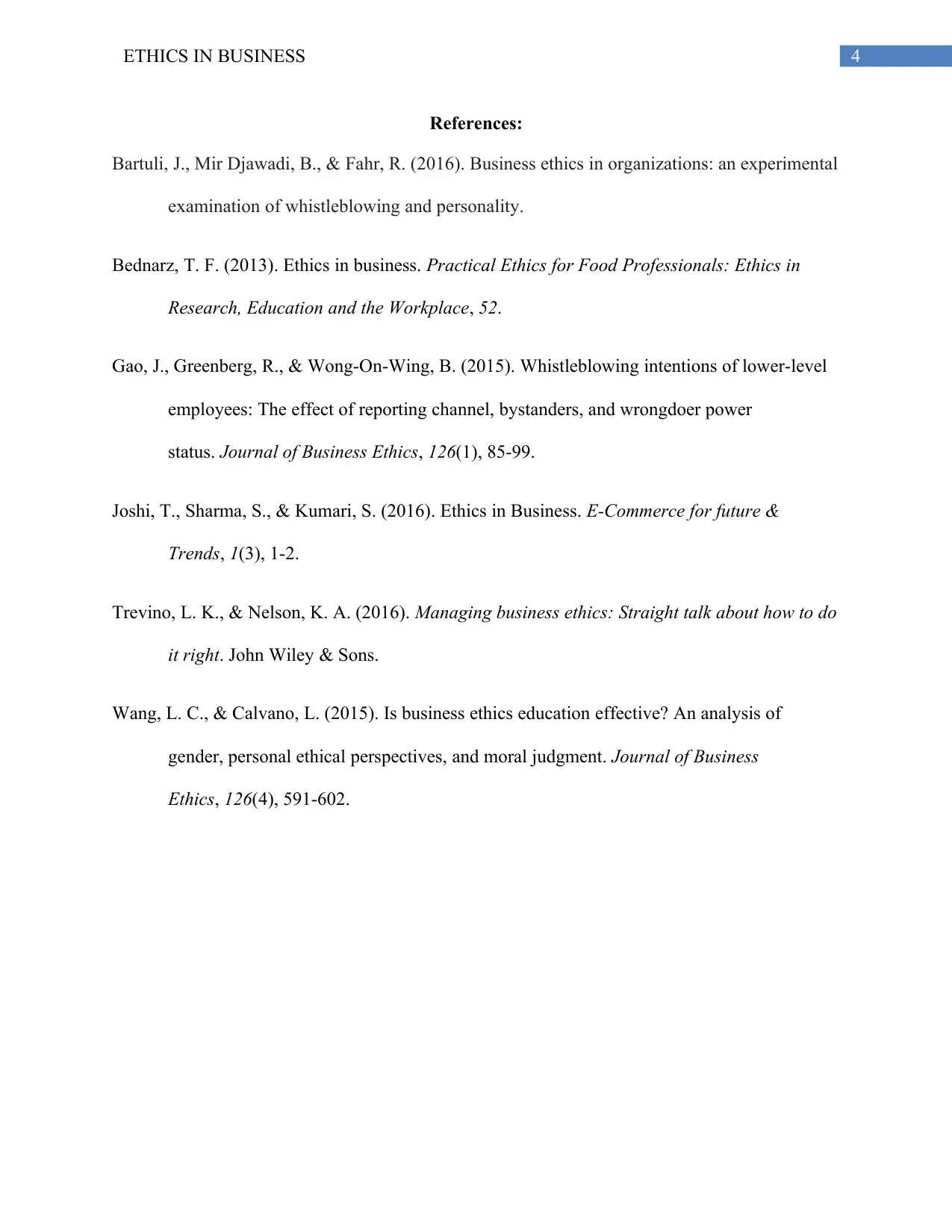
4ETHICS IN BUSINESS
References:
Bartuli, J., Mir Djawadi, B., & Fahr, R. (2016). Business ethics in organizations: an experimental
examination of whistleblowing and personality.
Bednarz, T. F. (2013). Ethics in business. Practical Ethics for Food Professionals: Ethics in
Research, Education and the Workplace, 52.
Gao, J., Greenberg, R., & Wong-On-Wing, B. (2015). Whistleblowing intentions of lower-level
employees: The effect of reporting channel, bystanders, and wrongdoer power
status. Journal of Business Ethics, 126(1), 85-99.
Joshi, T., Sharma, S., & Kumari, S. (2016). Ethics in Business. E-Commerce for future &
Trends, 1(3), 1-2.
Trevino, L. K., & Nelson, K. A. (2016). Managing business ethics: Straight talk about how to do
it right. John Wiley & Sons.
Wang, L. C., & Calvano, L. (2015). Is business ethics education effective? An analysis of
gender, personal ethical perspectives, and moral judgment. Journal of Business
Ethics, 126(4), 591-602.
References:
Bartuli, J., Mir Djawadi, B., & Fahr, R. (2016). Business ethics in organizations: an experimental
examination of whistleblowing and personality.
Bednarz, T. F. (2013). Ethics in business. Practical Ethics for Food Professionals: Ethics in
Research, Education and the Workplace, 52.
Gao, J., Greenberg, R., & Wong-On-Wing, B. (2015). Whistleblowing intentions of lower-level
employees: The effect of reporting channel, bystanders, and wrongdoer power
status. Journal of Business Ethics, 126(1), 85-99.
Joshi, T., Sharma, S., & Kumari, S. (2016). Ethics in Business. E-Commerce for future &
Trends, 1(3), 1-2.
Trevino, L. K., & Nelson, K. A. (2016). Managing business ethics: Straight talk about how to do
it right. John Wiley & Sons.
Wang, L. C., & Calvano, L. (2015). Is business ethics education effective? An analysis of
gender, personal ethical perspectives, and moral judgment. Journal of Business
Ethics, 126(4), 591-602.
1 out of 5
Related Documents
Your All-in-One AI-Powered Toolkit for Academic Success.
+13062052269
info@desklib.com
Available 24*7 on WhatsApp / Email
![[object Object]](/_next/static/media/star-bottom.7253800d.svg)
Unlock your academic potential
Copyright © 2020–2026 A2Z Services. All Rights Reserved. Developed and managed by ZUCOL.





